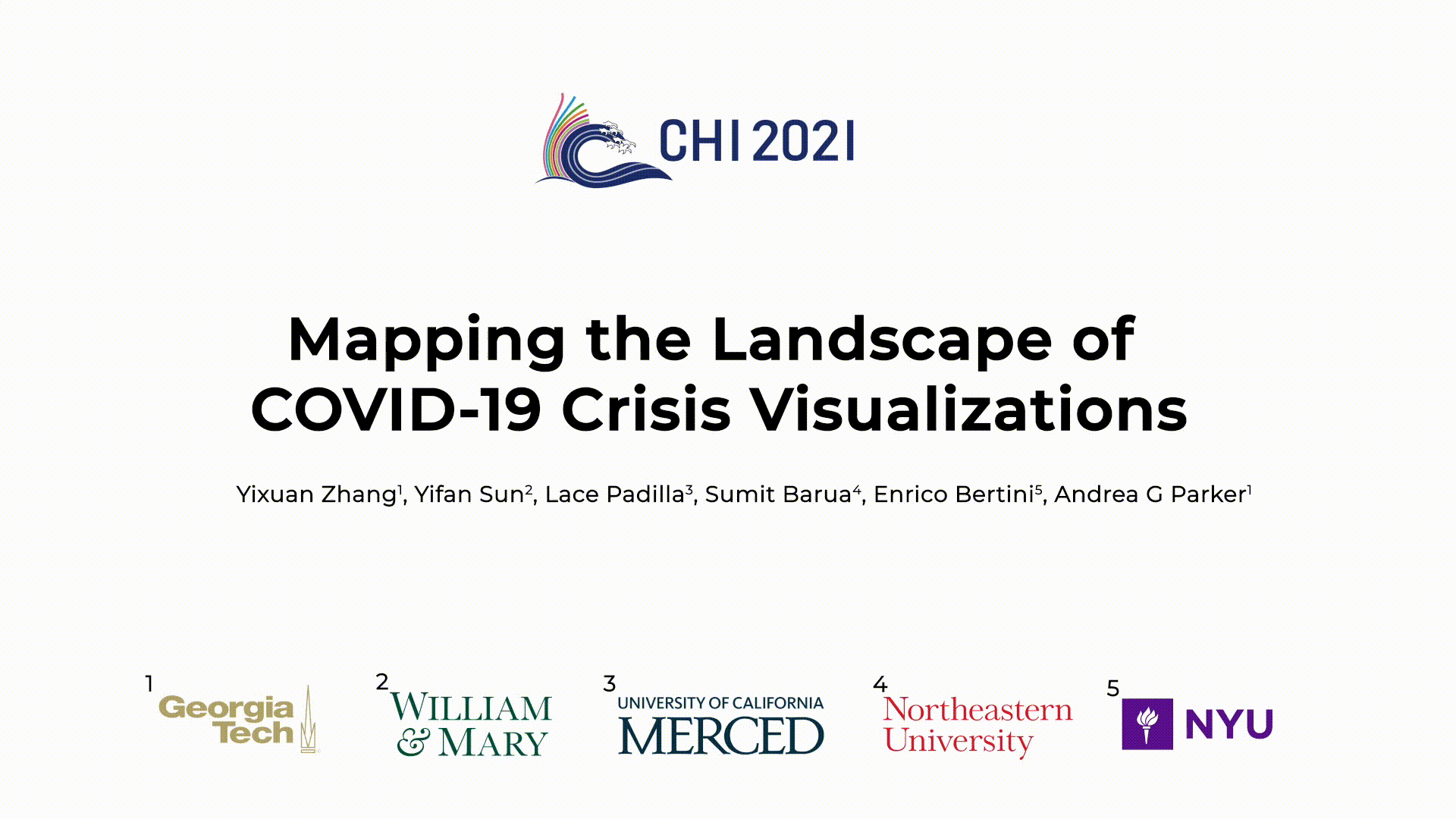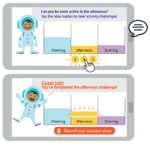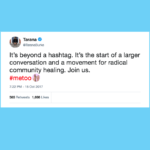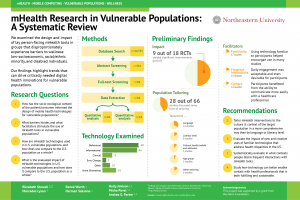Current Work
Using Mobile Technology to Prevent Maternal Mortality in Black Women
Maternal morbidity and mortality rates are disproportionately higher in Black women compared to any other ethnic/racial group. The postpartum period is the most critical yet most neglected phase for preventing suboptimal or fatal maternal health outcomes. Approximately half of maternal deaths occur in the postpartum period, when women face a range of physical and emotional challenges and systems of coordinated care are limited. Many women do not see a provider until 3 to 6 weeks after hospital discharge, and immediate health concerts may be missed during this interval.
Mobile health (mHealth) technology offers several opportunities for supporting wellbeing, including capabilities such as automated text messaging, tailored medical advice, and personalized notifications to encourage specific health behaviors (e.g., exercising or taking medications). mHealth interventions that connect with women soon after discharge may assist in individualizing and formalizing support for women in the early postpartum period.
In this project, we are developing a mobile application called PM3 (Preventing Maternal Mortality Using Mobile Technology). PM3 is being designed for and with Black women to help mothers manage their health after having a baby and ensure access to social support and community resources.
Digital Support for Black Women’s Maternal Mental Health
COVID-19 is profoundly impacting pregnant women and new mothers. As the COVID-19 pandemic has caused models of healthcare to rapidly shift and as introduced widespread economic and social stressors, there is a vital need for innovations that help expecting women and new mothers manage their mental health, given that prenatal and postpartum stress threatens the wellbeing of the mother and child. Research is especially needed in the context of Black women, who have the highest rates of adverse maternal health outcomes (e.g., maternal mortality and maternal depression), lower utilization of and access to prenatal care, and significant lifetime and chronic stress exposure.
With funding from a Georgia Tech seed grant, this project is using qualitative and quantitative methods to examine Black women’s experiences with digital mental health supports amidst COVID-19, and opportunities for improved digital support in the future.
SavvyHER
Black women have the second highest rate of all new HIV infections in the U.S. after men who have sex with men, and they account for 69% of all HIV diagnoses among women in the South (e.g., Georgia).
In this project, we are developing and evaluating Savvy HER (Sexual/HIV Empowerment Resource), an evidence-based and theory-driven mobile application (app), specifically designed for PrEP-eligible Black women. This study aims to determine the feasibility, acceptability, and usability of the app. This study will inform a subsequent RCT (R01) to determine the effectiveness and efficacy of the mobile app on uptake of HIV prevention behaviors.
Examining Information-Seeking During Crises

COVID-19 is disproportionately impacting some communities in the United States, such as low-income and racial and ethnic minority groups. Public health researchers have attributed these disparities to a variety of social determinants of health that have long created inequitable health outcomes. These populations are also more likely to be exposed to social and physical environmental factors that predispose racial/ethnic minority and low-income groups to higher rates of the co-morbidities that are associated with COVID-19 complications (e.g., obesity and diabetes). This research, applying mixed methods (a longitudinal survey and qualitative interviews), examines COVID-19 information consumption among traditionally marginalized populations. Specifically, our ongoing work examines COVID-19 information exposure, attitudes towards this information, their online trust, and the impacts of consuming COVID-19 information on psychological and emotional wellbeing with a focus on traditionally marginalized populations, such as low-income adults.
Examining Knowledge Production and Decision-making Processes of Crisis Visualizations
 The COVID-19 Pandemic is touching every part of our interconnected world. Its impact is being felt in all parts of our lives. An enormous number of visualizations designed to communicate, understand, analyze, and predict a constantly changing situation are appearing on the Internet every day, created by our biomedical community, health care systems, governments, news media, and the data visualization community at large.
The COVID-19 Pandemic is touching every part of our interconnected world. Its impact is being felt in all parts of our lives. An enormous number of visualizations designed to communicate, understand, analyze, and predict a constantly changing situation are appearing on the Internet every day, created by our biomedical community, health care systems, governments, news media, and the data visualization community at large.
As an initial foray into this research space, we conducted a comprehensive review of 668 COVID-19 visualizations. We present our findings through a conceptual framework derived from our analysis, that examines who, (uses) what data, (to communicate) what messages, in what form, under what circumstances in the context of COVID-19 crisis visualizations.
Smart and Connected Churches
 Churches play a major role in providing social support to address health inequities within various communities in the United States, in part by connecting church members to services. While public health has a history of disseminating interventions in faith communities, little work has explored how technologies can be used to tailor interventions to the unique culture of each church community. Following Community Based Participatory Research principles, we partnered with predominantly Black churches to develop and evaluate an mHealth intervention.
Churches play a major role in providing social support to address health inequities within various communities in the United States, in part by connecting church members to services. While public health has a history of disseminating interventions in faith communities, little work has explored how technologies can be used to tailor interventions to the unique culture of each church community. Following Community Based Participatory Research principles, we partnered with predominantly Black churches to develop and evaluate an mHealth intervention.
Social Computing Supports for Youth Civic Engagement
 This project is about designing technology tools with the aim of empowering teenagers to engage in social action that addresses health disparities in their communities. We have done participatory observations to understand the challenges that youth empowerment organizations face.
This project is about designing technology tools with the aim of empowering teenagers to engage in social action that addresses health disparities in their communities. We have done participatory observations to understand the challenges that youth empowerment organizations face.
Previous Work
Experiential Learning Technologies for Family Fitness
 We designed a sensor-based physical activity tracking tools to support healthy behaviors for children in low-income families. We work closely with families to target the application more directly at their needs while adding features to support “experiential learning”—the idea that reflecting on concrete past experiences can help people develop insights that guide their future behavior. This project received a 3-year grant from the National Science Foundation.
We designed a sensor-based physical activity tracking tools to support healthy behaviors for children in low-income families. We work closely with families to target the application more directly at their needs while adding features to support “experiential learning”—the idea that reflecting on concrete past experiences can help people develop insights that guide their future behavior. This project received a 3-year grant from the National Science Foundation.
Community-Driven Technologies for Family Physical Activity Promotion
 Sedentary living is one major contributing factor to childhood obesity; as such, interventions that help young children increase their physical activity levels are needed. Involving parents in these interventions is critical, given parents’ influence on children’s physical activity environments and the powerful impact they have as role models. The project seeks to increase physical activity within the family unit, that is, in both parents and young children.
Sedentary living is one major contributing factor to childhood obesity; as such, interventions that help young children increase their physical activity levels are needed. Involving parents in these interventions is critical, given parents’ influence on children’s physical activity environments and the powerful impact they have as role models. The project seeks to increase physical activity within the family unit, that is, in both parents and young children.
Digital Support for Alzheimer’s Disease Caregivers
 The number of informal caregivers who are caring for family members with Alzheimer’s Disease (AD) is rising dramatically. These caregivers have numerous mental and physical health problems associated with the burdens of care. In this project, we are developing a digital game to increase physical activity and social connections for the AD caregivers.
The number of informal caregivers who are caring for family members with Alzheimer’s Disease (AD) is rising dramatically. These caregivers have numerous mental and physical health problems associated with the burdens of care. In this project, we are developing a digital game to increase physical activity and social connections for the AD caregivers.
#MeToo: The Networked Disclosure Landscape of Twitter
 Following a tweet from actress Alyssa Milano calling on women to share the phrase “me too” if they have been sexually harassed or assaulted, thousands of women disclosed experiences of sexual violence, sometimes for the first time, through the hashtag #MeToo. To understand the landscape painted by these disclosures and the effect of disclosing these experiences publicly, we study the conversational social network that emerged around the #MeToo.
Following a tweet from actress Alyssa Milano calling on women to share the phrase “me too” if they have been sexually harassed or assaulted, thousands of women disclosed experiences of sexual violence, sometimes for the first time, through the hashtag #MeToo. To understand the landscape painted by these disclosures and the effect of disclosing these experiences publicly, we study the conversational social network that emerged around the #MeToo.
mHealth Systematic Review
 There has been a proliferation of research examining how mobile health (mHealth) applications can encourage wellness. A growing focus of this work has been exploring how mHealth tools can promote healthy behaviors within vulnerable populations. We conducted a systematic review of such research, examining the design and impact of mHealth tools for low-socioeconomic individuals and racial/ethnic minority groups. Our findings highlight trends that can drive critically needed digital innovations in health promotion for populations that experience disproportionate barriers to wellness.
There has been a proliferation of research examining how mobile health (mHealth) applications can encourage wellness. A growing focus of this work has been exploring how mHealth tools can promote healthy behaviors within vulnerable populations. We conducted a systematic review of such research, examining the design and impact of mHealth tools for low-socioeconomic individuals and racial/ethnic minority groups. Our findings highlight trends that can drive critically needed digital innovations in health promotion for populations that experience disproportionate barriers to wellness.